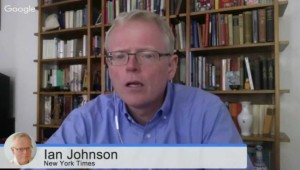
Journalist Ian Johnson interviews history professor Jeremy Brown in the New York Times on the 50-year remembrance of the Cultural Revolution. Brown dislikes the remembrance, as it focuses on the – limited – suffering of the intellectuals, while there is no interest in what happened at the country side, and a way more important event, the Four Cleanups.
Ian Johnson:
Q. Why was it so important?
A. This was the aftermath of the Great Leap Famine [considered one of the worst famines in history, with around 30 million deaths]. Mao blamed the famine on bad officials in local areas who were corrupted by remnant Nationalist forces and by landlords. He said some places didn’t do land reform well and that’s why the famine happened. It’s because of impurity in local village organization — that was Mao’s rationalization. Around this time, the early 1960s, there was a resurgence of religious practices and economic activity — things that look like capitalist buying and selling of goods. Villages are making money on the side outside the socialist economic plan.
So Mao declared “we can never forget class struggle” and started the Four Cleanups. It was traumatic. Outside work teams went to villages, investigated local officials and violently punished people they considered class enemies.
Q. It’s not something we hear about too much.
A. That’s because it was rural, and rural people don’t get to tell their stories. We should have been talking about this 50-year anniversary two years ago.
Q. What’s another reason for not liking the anniversary this year?
A. It was really a three-year period. The Red Guards were part of it, but there was more violence in 1968-69, when Mao sent the army and tried to restore order by setting up Revolutionary Committees. But my pessimistic expectation is the anniversary will mostly focus on Red Guard chaos narratives, and suffering of elite intellectuals.
Q. Intellectuals write history.
A. Intellectuals write books and their experiences do matter. But we tend to forget how the majority of people lived.
Q. Who else do we need to hear about?
A. We don’t hear too much about the “rebels.” They were workers in factories, not Red Guards, and they got a seat at the table when the Revolutionary Committees were set up in 1968. They ran factories and many workplaces along with the army. They were the ones who got scapegoated at the end of the Cultural Revolution. They’re not super literate or well-connected enough to get their stories out, and their stories are embarrassing to the officials who used them and survived and did well after the Cultural Revolution. They’re called “Gang of Four elements.” We don’t know much about them at all.
Ian Johnson is a speaker at the China Speakers Bureau. Do you need him at your meeting or conference? Do get in touch or fill in our speakers´request form.
Are you looking for more experts on political change at the China Speakers Bureau? Do check out this list.
The Return of Politics. Earlier this year we talked with Ian Johnson on what has changed since Xi Jinping came to power






